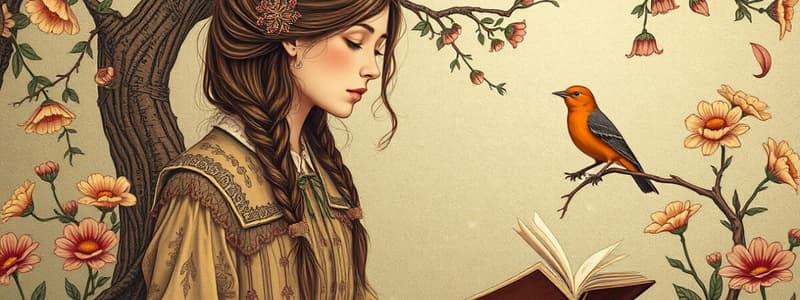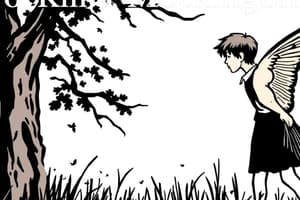Podcast
Questions and Answers
What does Scout's action of rubbing Jem's nose in the dirt depict?
What does Scout's action of rubbing Jem's nose in the dirt depict?
- Fear of societal norms
- Adherence to gender roles
- Defiance of traditional gender roles (correct)
- Acceptance of sexism
What does the statement about drowning dinner in syrup emphasize?
What does the statement about drowning dinner in syrup emphasize?
Scout's immaturity and inability to see things from others' perspectives.
Scout ran past the _____ place as fast as she could.
Scout ran past the _____ place as fast as she could.
Radely
Atticus confirms they are poor, indicating the hardship during the Great Depression.
Atticus confirms they are poor, indicating the hardship during the Great Depression.
What does Jem mean by saying, 'It's time you started bein like a girl and acting right'?
What does Jem mean by saying, 'It's time you started bein like a girl and acting right'?
What does Dill's statement about marrying Scout illustrate?
What does Dill's statement about marrying Scout illustrate?
Scout expresses interest in clothes as a typical interest of women in the 1930s.
Scout expresses interest in clothes as a typical interest of women in the 1930s.
What does Aunt Alexandra's integration into Maycomb society signify?
What does Aunt Alexandra's integration into Maycomb society signify?
Flashcards are hidden until you start studying
Study Notes
Gender Roles and Prejudice
- Scout challenges traditional gender roles in 1930s Alabama, representing individuality against societal norms.
- Jem's remark highlights societal expectations of masculinity, suggesting scout should conform to being "like a girl," reflecting sexism prevalent during the era.
Childhood Innocence and Immaturity
- Scout’s observation of Jem regarding dinner illustrates her childish perspective, highlighting her immaturity and lack of empathy, reinforcing moral lessons taught by Atticus.
Fear and Southern Gothic Elements
- Running past the Radley house symbolizes childhood fears and aligns with themes of innocence, common in Southern Gothic literature.
Economic Hardship
- Scout's inquiry about poverty and Atticus's confirmation connects to the Great Depression, illustrating the economic struggles faced by families in small-town Alabama.
Relationships and Irony
- Dill’s promise to marry Scout introduces themes of childhood love and societal expectations of family, while also bearing irony since Dill is based on Truman Capote, a gay author.
Individuality vs. Societal Expectations
- Scout’s indifference towards typical female interests reflects societal prejudices of the 1930s, showing her struggle to fit into norms set by characters like Aunt Alexandra.
Family Dynamics and Societal Critique
- Aunt Alexandra’s seamless fitting into Maycomb highlights the contrast between her views and those of Scout and Jem, emphasizing their divergence from common prejudices and racism in society.
Studying That Suits You
Use AI to generate personalized quizzes and flashcards to suit your learning preferences.




